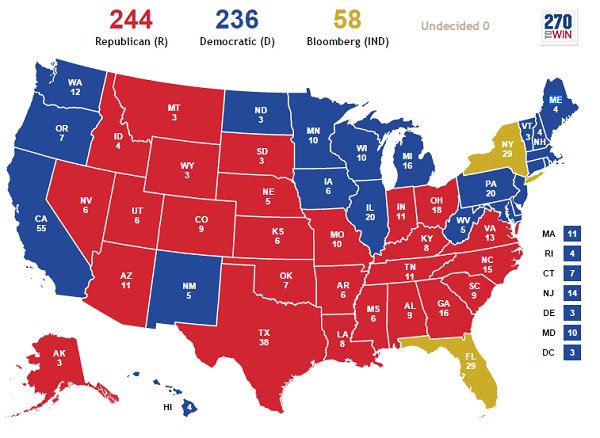Michael R. Bloomberg has instructed advisers to draw up plans for a potential independent campaign in this year’s presidential race. His advisers and associates said he was galled by Donald J. Trump’s dominance of the Republican field, and troubled by Hillary Clinton’s stumbles and the rise of Senator Bernie Sanders of Vermont on the Democratic side.
Mr. Bloomberg, the billionaire former mayor of New York City, has in the past contemplated running for the White House on a third-party ticket, but always concluded he could not win. A confluence of unlikely events in the 2016 election, however, has given new impetus to his presidential aspirations.
- Alexander Burns & Maggie Haberman, The New York Times, 23rd Jan 2016
When Americans go to the polls in November, they will be voting for their local representative in the House of Representatives, the people who will represent their state in the Senate and the President. Or rather, they will not be voting for the President but votes in the arcane system known as the Electoral College.
Due to the strange way that the Electoral College works, it's possible to become President with less than 25% of the popular vote by winning the College votes of the least populace 40 states so, possible to become President by winning the 11 most populace stats or by winning by an even more bizarre method which is what led to the "corrupt bargain" of 1824.
If no candidate wins half the number of Electoral College votes, then the decision is sent to a joint sitting of the House and Senate and rather than it being a simple majority of members of Congress, they vote as whole states. This is where the story gets interesting. To force a meeting on the Congress to decide who the President is, there needs to be no clear winner in the Electoral College.
Looking through the long list of results, we find that although George Washington kind of ran as an independent (if there even was such a thing back then and even then he ran unopposed), every single President from John Adams onward ran under the guise of some political party and that ever since the end of the so-called period of "good feelings" and the end of the Whigs, all attempts to run as a third party candidate have ended in abysmal failure. Not even former President Teddy Roosevelt had a particularly successful campaign against the existing political party machines.
You don't actually need to win 270 of the Electoral College votes to win the election. All you need is the support of the 50 states. Assuming that Bloomberg would win his home state of New York and provided that the chads didn't fall off in Florida, Bloomberg on current polling would only need to win those two states and there would be no clear winner in the Electoral College.
To be honest, Bloomberg's decision to even contemplate running as a third party candidate seems baffling to me. I imagine that his politics which would nominally be pro-business and very much in favour of Wall Street would have aligned him with the Republican Party. Though given the whole sort of general mish-mash and dog and pony show that is the 2016 Republican race so far, maybe it just wasn't worth the effort.
If you'd asked me six weeks ago who the Democratic candidate would end up being, I'd have said that Hilary Clinton was so far in front that it was a walkover, a cakewalk and a four base walk around. Bernie Sanders has come up out of pretty well much nowhere and he's making noises that make me look like I have cake on my face.
Before we even get to what Bloomberg intends to do, what his policy platform is, its worth noting what kind of uphill task that any third party candidate faces. By not aligning themselves with a party, they may pull voters away from the existing majors but in order to win the Presidency, they'd need to steal perhaps more than half from both camps. That might be extremely problematic because when it comes to voters and political support, people tend to become as rusted on as they would do with a sporting team. A third party candidate might be able to draw in some portion of the 46% of the electorate who can't be bothered to vote (no, I reject the "right" not to vote as poppycock) but is that enough?
Assuming a third party candidate did somehow achieve what no other has done ever, once they found themselves in the Oval Office, they'd have to learn pretty quickly with the Congress. This would mean showing themselves as aligned with one of the major parties on some majority of issues as some point and this harks back to the basic problem that every President faces; if they want to achieve anything, they need to work with the Congress.
If Bloomberg happens to appeal to the members of a newly elected Congress, who I'm assuming would tend to be Republican controlled in the House and the Senate, then Bloomberg could very well be elected by members who would be forced to choose between him, Trump or Clinton; since a Republican controlled House and Senate would prefer Bloomberg over Clinton, he could be installed as president with as little as 11% of the popular vote. If that sounds insane, remember that John Q. Adams in the "corrupt bargain" election of 1824, won only 30.9% of the popular vote, or less than 1% of the adult population of the United States.


No comments:
Post a Comment